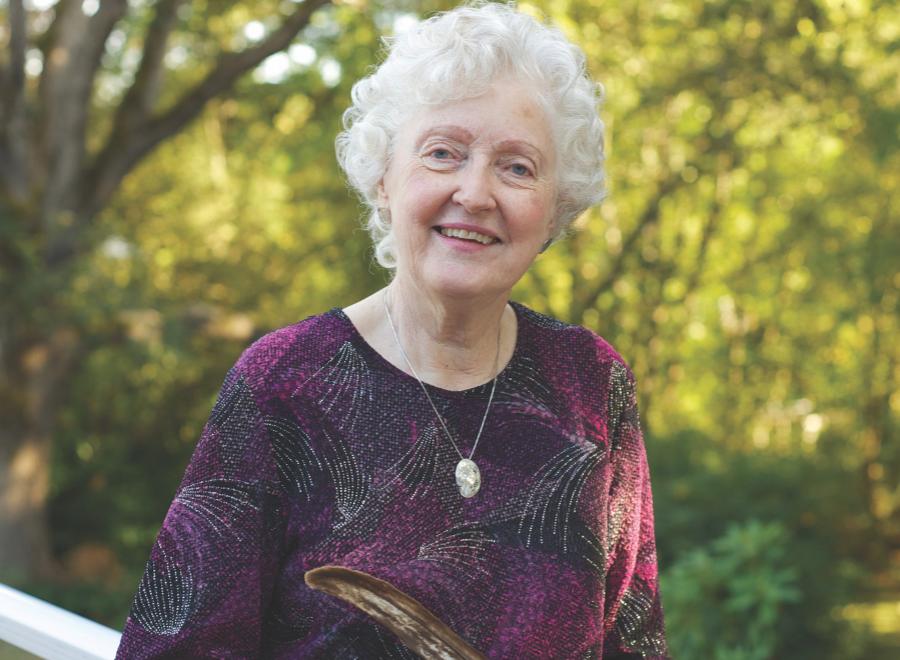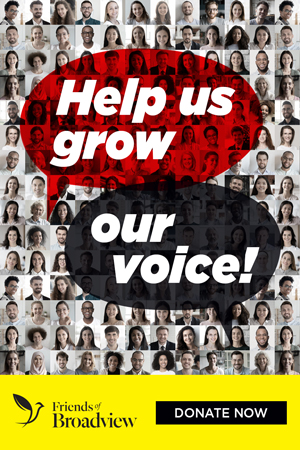Florence Kaefer spoke with Pieta Woolley for a series on Intriguing United Church people you may not know but should.
Reconciliation will happen in Canada one person at a time.
Every fall, when the CBC does a “back to school” call-in show, moms will say, “I cry when I leave my child at kindergarten,” or “I’m worried about sending my teen away to university.” Oh, heavens! I used to call in [and remind listeners about children being taken away from their families to attend residential schools]. I don’t call in anymore.
I didn’t think about reconciliation — not as much as anyone should — until I had kids of my own. I started to think about a scenario of someone from another culture coming to my house and saying, “I’m going to take your children away so they’ll be more successful.” When I started thinking that way, I started wondering, what on earth did we do?
My mother believed that all people were equal. She would take First Nations people into her house. Many people frowned on her, but she always welcomed everyone into her home. She had read Uncle Tom’s Cabin and Pauline Johnson’s The Shagganappi. She was interested in people.
I belonged to a very active young people’s group at Young United Church in Winnipeg. We all went off to different United Church-led careers: nurses, teachers, ministers. One time, we had our picture on the cover of the United Church bulletin. It was a truly exceptional group.
Part of Young United burnt down many years later. The part of it left standing has become a place for people living on the street to do laundry, have a shower. It’s still a place of service.
You fall in love with your first class if you love teaching. Mine was in Norway House [a United Church-run residential school in Manitoba].
I went to the Banff School of Fine Arts [in Alberta] one summer. We worked outdoors on location. It was a fabulous experience. I thought, how can I get back here? So I moved west, to the Port Alberni [B.C.] residential school.
During a car trip in Manitoba, my niece and I stopped at a restaurant, and the CD was just hanging there like I was supposed to look at it. I bought it. It was Edward Gamblin’s CD Cree Road. I read the liner notes. They said, “Edward was abused in his school at Norway House.” I realized he had been one of my students. I cried when I read it. I had no idea how the children had been hurt in the residential school.
When your own children wake up in the night from a bad dream, you comfort them. [The residential school children] had no mother to comfort them. How can you take children away from their mothers?
Edward was able to forgive what two pedophiles had done to him. He said, “I don’t know why there are so many terrible things in every corner of my life, but I still have my faith.” I think that puts him into the category of Greatest Canadians.
I don’t struggle with my faith. There was a time when I didn’t go to church. After I worked in Alberni and there was such a terrible pedophile in that school, my husband went to the United Church minister in Alberni, and he wouldn’t even think about doing anything about it. [The minister] said, “I’m ashamed to have the ‘UCC’ name on the bus from that school.” I think that kind of shook me, after I was there.
Getting to know First Nations, I understand God better. Because God is the Creator. Through the church, we have forgotten about the Creator. I have a clear feeling of God the Creator through my experiences. My faith has been enhanced.
To reconcile with someone is to understand their point of view. To accept them. To give them the space to be who they really are. It’s a willingness to learn the other culture.
We certainly haven’t reached reconciliation with First Nations in Canada yet. We have a long way to go.
I feel I have experienced reconciliation because Edward [who has since died] made me feel it. He was way, way out beyond me in his understanding of what it was all about. He let me come over to the other side. Because of that, I feel I have been accepted. And I have accepted him. And we are one people.
***
This story first appeared in The United Church Observer’s November 2014 issue with the title “Florence Kaefer, reconciliation pioneer.”


Comments